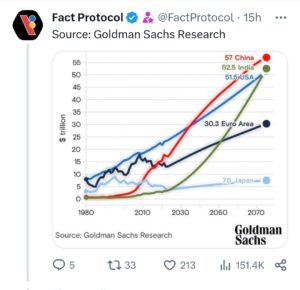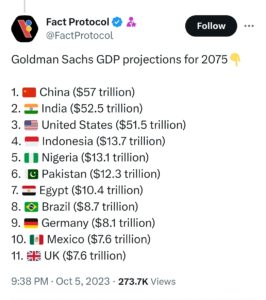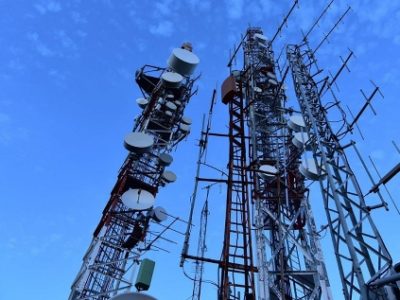“The most intriguing part is the Goldman Sachs projection for 2075, where Nigeria is poised to break into the top 5 of the world’s largest economies.”
By Moses Braimah
In the ever-evolving landscape of global economics, Nigeria stands at a pivotal juncture. As it charts its course toward the year 2075, this article explores the strategic initiatives and critical reforms the nation must undertake to not only secure its place among the world’s top economies but to potentially surpass expectations on the international stage.
RELATED: Fintech will determine the powerhouse economies of next 10 years
The evolution of the world’s largest economies, as per World Statistics, has been a fascinating journey from 1980 to the projected outlook in 2050 and beyond according to World Statistics and Goldman Sachs. Here are the key factors:
1980 to 2050: Over this period, we witnessed a seismic shift in global economic power. Traditional economic giants like the United States, China, Japan, Germany, and the United Kingdom maintained their dominance, with the U.S. consistently at the forefront.
Emergence of China: The standout feature is China’s remarkable ascent. It surged from being a relatively modest economy in 1980 to challenging the U.S. for the top spot by 2050. This transformation underscored China’s rapid industrialization and export-driven growth.
Diverse Growth Patterns: Japan saw steady growth but gradually slipped in rankings. Germany remained a strong European economy. India emerged as a major player, reaching the third position by 2050, buoyed by a large and youthful population.
Goldman Sachs Projection (2075): The most intriguing part is the Goldman Sachs projection for 2075, where Nigeria is poised to break into the top 5 of the world’s largest economies. This reflects Africa’s potential as an economic powerhouse and Nigeria’s role in that development.
Changing Global Dynamics: These projections highlight the dynamic nature of the global economy. Economic power isn’t static, and emerging economies are reshaping the landscape. Nigeria’s ascent underscores the importance of African economies on the world stage.
Challenges and Opportunities: While these projections are exciting, they also bring challenges such as ensuring sustainable growth, addressing inequality, and managing environmental concerns. The world must seize the opportunities presented by this evolving economic order responsibly.
The journey of the world’s largest economies from 1980 to 2050 and the Goldman Sachs projection for 2075 offer a glimpse into the shifting tides of global economic power. It’s a reminder that adaptability and foresight are crucial for countries and businesses navigating this ever-changing landscape.
“Foster an environment conducive to innovation, startups, and tech-driven industries, positioning Nigeria as a technological hub.”
So what should Nigeria be doing differently to ensure this enviable position by 2075?
My take. For Nigeria to reach and potentially exceed its projected position in the top 5 economies by 2075, several key actions and strategies are essential:
Diversify the Economy: Reduce over-reliance on oil exports by diversifying into sectors like agriculture, manufacturing, technology, and renewable energy. A diverse economy is more resilient and less susceptible to global market fluctuations.
Invest in Infrastructure: Modernize and improve infrastructure to facilitate trade, transportation, and connectivity. This includes roads, ports, airports, and digital infrastructure to attract investments and stimulate economic growth.


Educational and Skills Development: Prioritize education and skills development to build a knowledgeable workforce. Invest in quality education systems that equip citizens with the skills needed for the jobs of the future, fostering innovation and entrepreneurship.
Harness Youth Demographic: Leverage the youthful population to drive economic growth. Implement policies and programs that support youth entrepreneurship, job creation, and vocational training to unlock their potential.
Promote Innovation and Technology: Encourage research, development, and adoption of emerging technologies. Foster an environment conducive to innovation, startups, and tech-driven industries, positioning Nigeria as a technological hub.
Strengthen Governance and Reduce Corruption: Enhance transparency, accountability, and governance to attract foreign investment and ensure efficient allocation of resources. Rooting out corruption is crucial for fostering trust and creating a favorable business environment.
Sustainable Development and Green Initiatives: Embrace sustainable development practices to balance economic growth with environmental responsibility. Invest in renewable energy, sustainable agriculture, and eco-friendly industries to attract green investments and mitigate climate change impacts.
Attract Foreign Direct Investment (FDI): Implement policies to attract foreign investment in strategic sectors, providing incentives and a stable regulatory environment. Foster partnerships and collaborations to tap into external expertise and capital.
Promote Intra-African Trade: Enhance trade within the African continent by participating actively in regional trade agreements. Strengthen relationships with neighboring countries and the African Union to bolster economic cooperation and trade.
Foster Political Stability and Security: Ensure political stability and security to create a conducive environment for investment and economic growth. Establish diplomatic relationships that promote peace and stability within the region and globally.
Social Welfare and Inclusion: Ensure social welfare programs and policies that promote inclusivity and reduce income inequality. A thriving middle class can drive domestic consumption.
Security and Stability: Enhance security measures to protect investments and ensure a stable environment for economic growth.
Infrastructure for Financial Services: Develop a robust financial system to facilitate access to credit and capital for businesses and individuals.
Long-Term Planning: Develop comprehensive long-term economic plans that span several decades, aligning policies with the goal of becoming a top global economy.
Investment in Healthcare: Improve healthcare infrastructure and access to quality healthcare services to ensure a healthy and productive population.
Fiscal Responsibility: Maintain prudent fiscal policies and manage public finances effectively to prevent economic crises.
By embracing these strategies, Nigeria can position itself for significant economic growth, potentially surpassing the projected 2075 mark and securing a prominent place among the world’s leading economies.
- Braimah is the Executive Project Director at Pacific Messages in Lagos





























